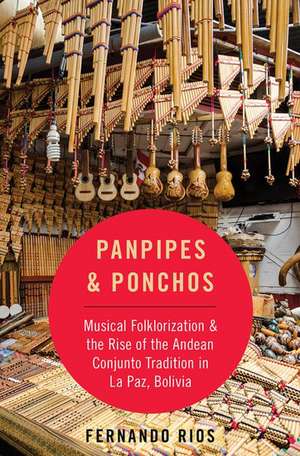Panpipes & Ponchos: Musical Folklorization and the Rise of the Andean Conjunto Tradition in La Paz, Bolivia: Currents in Latin American and Iberian Music
Autor Fernando Riosen Limba Engleză Paperback – 22 oct 2020
| Toate formatele și edițiile | Preț | Express |
|---|---|---|
| Paperback (1) | 266.75 lei 10-17 zile | |
| Oxford University Press – 22 oct 2020 | 266.75 lei 10-17 zile | |
| Hardback (1) | 581.72 lei 31-38 zile | |
| Oxford University Press – 22 oct 2020 | 581.72 lei 31-38 zile |
Din seria Currents in Latin American and Iberian Music
- 6%
 Preț: 230.33 lei
Preț: 230.33 lei - 9%
 Preț: 220.13 lei
Preț: 220.13 lei -
 Preț: 337.00 lei
Preț: 337.00 lei -
 Preț: 252.53 lei
Preț: 252.53 lei - 15%
 Preț: 412.89 lei
Preț: 412.89 lei - 27%
 Preț: 488.32 lei
Preț: 488.32 lei - 27%
 Preț: 375.50 lei
Preț: 375.50 lei - 10%
 Preț: 437.84 lei
Preț: 437.84 lei - 18%
 Preț: 128.58 lei
Preț: 128.58 lei - 29%
 Preț: 501.77 lei
Preț: 501.77 lei - 14%
 Preț: 155.46 lei
Preț: 155.46 lei - 15%
 Preț: 246.84 lei
Preț: 246.84 lei - 27%
 Preț: 448.52 lei
Preț: 448.52 lei - 23%
 Preț: 198.93 lei
Preț: 198.93 lei - 23%
 Preț: 737.44 lei
Preț: 737.44 lei - 12%
 Preț: 517.68 lei
Preț: 517.68 lei - 5%
 Preț: 252.70 lei
Preț: 252.70 lei - 9%
 Preț: 479.76 lei
Preț: 479.76 lei - 21%
 Preț: 418.70 lei
Preț: 418.70 lei - 12%
 Preț: 305.42 lei
Preț: 305.42 lei -
 Preț: 248.75 lei
Preț: 248.75 lei - 22%
 Preț: 363.56 lei
Preț: 363.56 lei - 18%
 Preț: 341.86 lei
Preț: 341.86 lei - 27%
 Preț: 370.02 lei
Preț: 370.02 lei - 7%
 Preț: 304.89 lei
Preț: 304.89 lei - 27%
 Preț: 342.73 lei
Preț: 342.73 lei -
 Preț: 341.88 lei
Preț: 341.88 lei - 11%
 Preț: 446.41 lei
Preț: 446.41 lei - 12%
 Preț: 322.41 lei
Preț: 322.41 lei - 27%
 Preț: 346.62 lei
Preț: 346.62 lei - 14%
 Preț: 303.19 lei
Preț: 303.19 lei - 27%
 Preț: 384.60 lei
Preț: 384.60 lei - 25%
 Preț: 586.53 lei
Preț: 586.53 lei - 12%
 Preț: 286.27 lei
Preț: 286.27 lei - 23%
 Preț: 725.73 lei
Preț: 725.73 lei - 10%
 Preț: 254.58 lei
Preț: 254.58 lei - 27%
 Preț: 353.47 lei
Preț: 353.47 lei
Preț: 266.75 lei
Preț vechi: 280.80 lei
-5% Nou
Puncte Express: 400
Preț estimativ în valută:
51.04€ • 53.29$ • 42.24£
51.04€ • 53.29$ • 42.24£
Carte disponibilă
Livrare economică 03-10 martie
Preluare comenzi: 021 569.72.76
Specificații
ISBN-13: 9780190692285
ISBN-10: 0190692286
Pagini: 296
Ilustrații: 7 music examples
Dimensiuni: 152 x 231 x 20 mm
Greutate: 0.41 kg
Editura: Oxford University Press
Colecția OUP USA
Seria Currents in Latin American and Iberian Music
Locul publicării:New York, United States
ISBN-10: 0190692286
Pagini: 296
Ilustrații: 7 music examples
Dimensiuni: 152 x 231 x 20 mm
Greutate: 0.41 kg
Editura: Oxford University Press
Colecția OUP USA
Seria Currents in Latin American and Iberian Music
Locul publicării:New York, United States
Recenzii
Fernando Rios' meticulously researched and fascinating history is an indispensable resource for understanding how Andean folk music came to take the world by storm. Although powerfully invoking ideas and images of indigenous Andean culture, Panpipes and Ponchos demonstrates that the conjunto (with its standard line-up of kena flute, charango, guitar, bombo drum, and later panpipes) was thoroughly transnational, middle class, and rooted in Bolivia's turbulent twentieth-century history.
Fernando Rios is the preeminent historian of what the world knows today as 'Andean music.' In this meticulously researched and theoretically profound book, he offers a model of well-crafted historical ethnomusicology: deeply grounded in the details of Bolivian musical nationalism and its transnational connections, yet offering broad insights about the intersections of music, ethnicity, class, and politics in Latin America in the twentieth century.
Fernando Rios is the preeminent historian of what the world knows today as 'Andean music.' In this meticulously researched and theoretically profound book, he offers a model of well-crafted historical ethnomusicology: deeply grounded in the details of Bolivian musical nationalism and its transnational connections, yet offering broad insights about the intersections of music, ethnicity, class, and politics in Latin America in the twentieth century.
Notă biografică
Fernando Rios is Associate Professor in Ethnomusicology at the University of Maryland. His research interests include Latin American (especially Bolivian) folkloric, indigenous, and popular music; folklorization and nation-building; music and social-political movements; the politics of cultural appropriation; and historical ethnomusicology.
